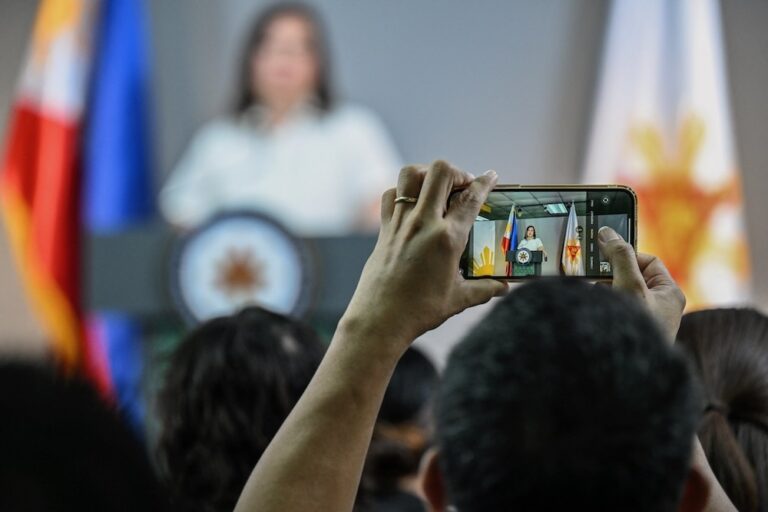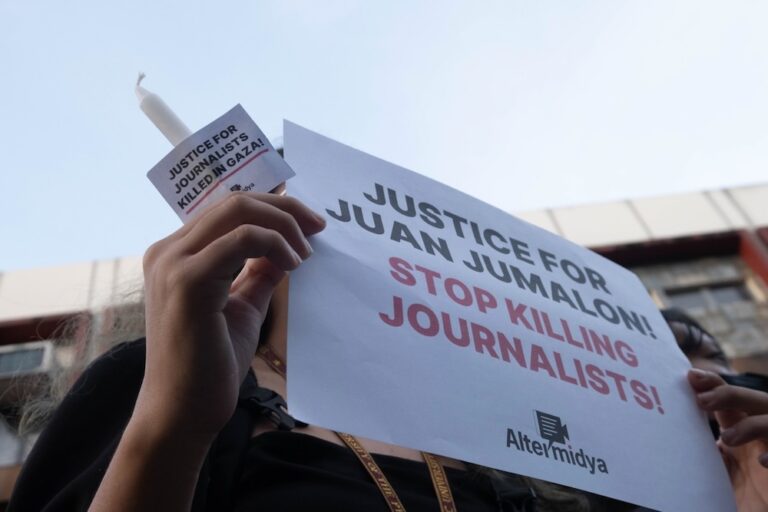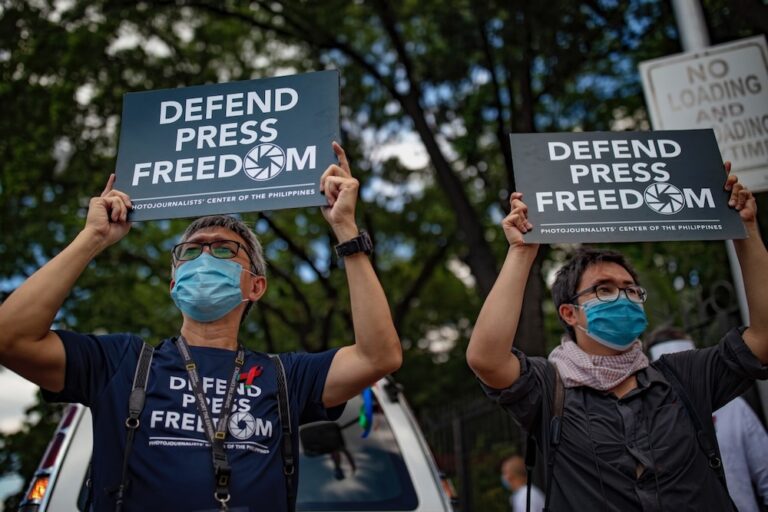(CMFR/IFEX) – Eleven journalists and media technicians from the Philippines’ biggest television network who were arrested for covering an incident involving about 20 soldiers in the Manila Peninsula Hotel in November 2007 have asked the Supreme Court to declare their arrest illegal and to protect them and other journalists from future government harassment. Led by […]
(CMFR/IFEX) – Eleven journalists and media technicians from the Philippines’ biggest television network who were arrested for covering an incident involving about 20 soldiers in the Manila Peninsula Hotel in November 2007 have asked the Supreme Court to declare their arrest illegal and to protect them and other journalists from future government harassment.
Led by senior correspondent Ces Oreña Drilon, employees of media giant ABS-CBN who were among those arrested in the 29 November incident filed a petition for a “writ of amparo and prohibition” seeking protection from government “threats of future arrests without warrant and acts of harassment against petitioners and other journalists, in the course or in consequence of the performance of their work, such as in the coverage of breaking news events similar to the Manila Peninsula Stand-off.”
The petition is a significant development in a worsening government-media confrontation triggered by the arrests and by a series of threats against media from the Arroyo government.
A group of officers and lower-ranking military accused of a 2003 mutiny managed to walk out of the courthouse where they were being tried on 29 November and hold a press conference in a Peninsula Hotel function room. Police later recaptured the soldiers and their civilian supporters, but also arrested journalists and media crew members covering the incident. Foreign correspondents, print and broadcast reporters, as well as ABS-CBN personnel were among the 50 media people arrested.
The petitioners cited as respondents government and police agencies and officials, among them Justice Secretary Raul Gonzalez, Interior and Local Government Secretary Ronaldo Puno, Philippine National Police Chief Director General Avelino Razon and National Capital Region Police Director Geary Barias.
The petitioners included producers and media technicians Mayjay Cabalit, Melanie Masecampo, Ruperto Ambil II, Mark Cadampog, Emelito Hao, Norbert Calupitan, Alexis Acuin, Bernie Lito Mallari, Randy Villan and Noel Alamar.
The “writ of amparo” is a “remedy available to any person whose right to life, liberty and security is violated or threatened with violation by an unlawful act or omission of a public official or employee, or of a private individual or entity.”
Drilon appealed to the Supreme Court to “immediately declare our arrests illegal and to issue a permanent protection order to restrain government authorities from enforcing any form of prior restraint on the press in the form of thinly veiled threats of government sanctions or ‘reminders’ of criminal liability.”
Maria Ressa, ABS-CBN news and current affairs head, said in a statement that ABS-CBN, which had the most number of journalists arrested during the incident “can’t stand by and watch a kind of creeping censorship test and weaken our democracy.”
Established in 1946, ABS-CBN is a Philippine multi-media conglomerate mainly involved in television and radio broadcasting. It is the largest integrated media and entertainment company in the country.
Civilians and soldiers led by former Navy lieutenant, now Senator Antonio Trillanes IV and Army Brig. Gen. Danilo Lim marched unimpeded to the Manila Peninsula Hotel in Makati City on 29 November. They demanded in a press conference the resignation of President Gloria Macapagal Arroyo and called on supporters to join them. Trillanes and his “Magdalo” group had walked out of a court hearing after being dismayed with the proceedings. They were being tried for a failed 2003 mutiny.
Government and police officials have since then issued warnings of future arrests if journalists defy police orders while covering similar events. The most recent was an 11 January 2008 “media advisory” by the Department of Justice (DOJ) which warned media organizations that they would be “criminally liable” if their reporters did not obey the orders of government authorities at the site of emergencies. The “advisory” was followed by a police declaration that they would use force to remove journalists from such sites if they refused to leave.


